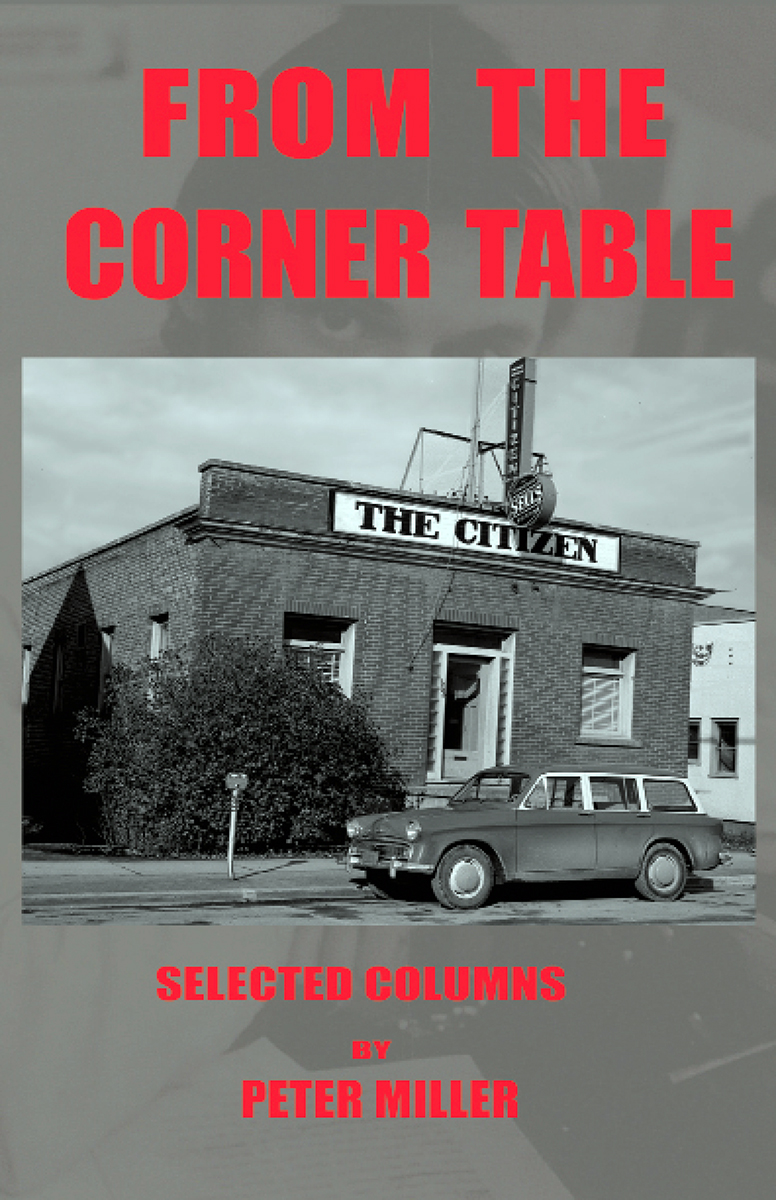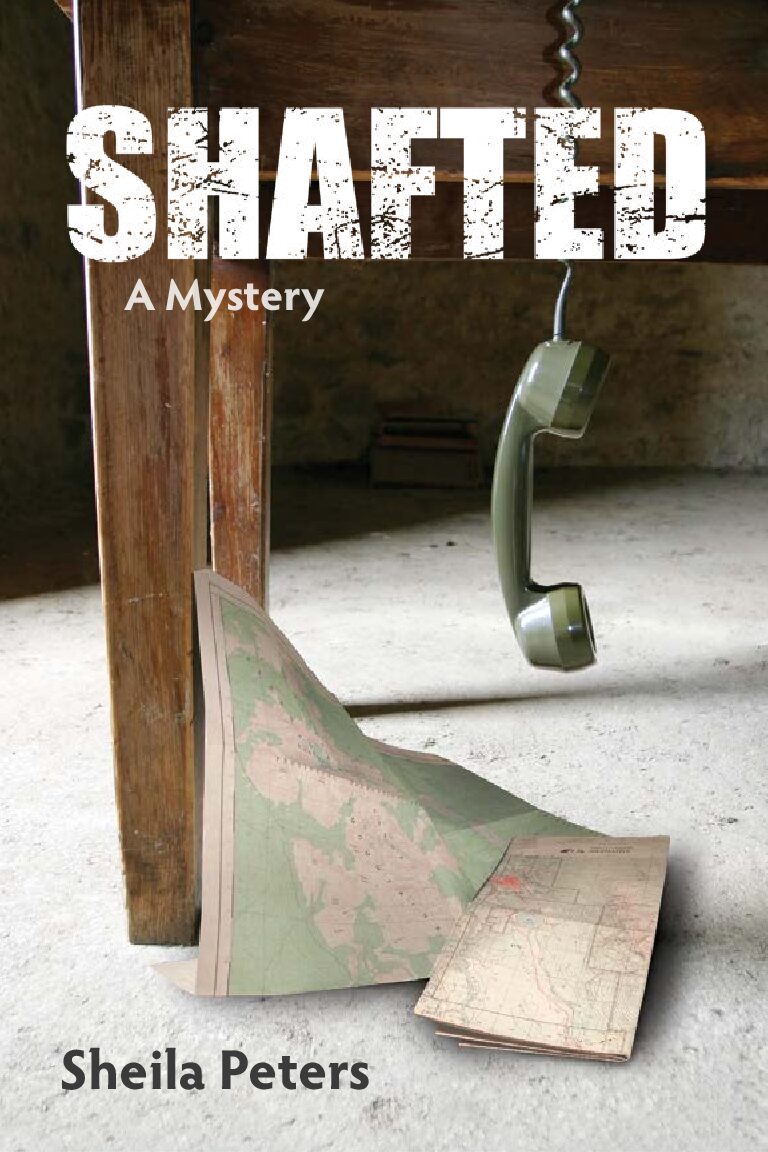From the Corner Table – selected columns
$2.50 – $5.00
During his 40 years as a newspaper man, Pete Miller worked as a photographer, city editor and news editor at The Prince George Citizen and as the editor of the Quesnel Cariboo Observer. He wrote editorials, political analysis, reviews, science-fiction stories, travel articles and fishing columns. But it was Pete’s sense of humour and his delight in the use of language that have always made his stories appealing to all.
Description
Anyone with an interest in newspapers and their roles, learned from Pete Miller. They couldn’t help it. It was influence by osmosis. Pete was a gifted and perceptive writer, as this brief collection of columns and articles attest.
During his 40 years as a newspaper man, Pete worked as a photographer, city editor and news editor at The Prince George Citizen and as the editor of the Quesnel Cariboo Observer. He wrote editorials, political anyalysis, reviews, science-fiction stories, travel articles and fishing columns. But it was Pete’s sense of humour and his delight in the use of language that have always made his stories appealing to all.
The vignettes in this collection resonate today because of the universality of their themes. They are about real people in a small town, presented with a wry touch and a distinct Cariboo seasoning.
Reviews:
Christine Hinzmann
A new local history book shines a light on a newspaper editor whose journalism career in the region spanned five decades.
From The Corner Table is a collection of columns written by the late Pete Miller during his days at the Prince George Citizen and the Quesnel Cariboo Observer. The columns were chosen by longtime friends John Harris and Vivien Lougheed, along with former Citizen reporter Jim Stirling.
Miller started as a photographer at The Citizen in 1963, then became city editor, moved to then sister paper the Quesnel Cariboo Observer in 1968 and returned some years later to resume city editor duties, did layout and computerized the newsroom. He worked until he got sick and died in 2001.
Stirling recalls how Miller thrived during his time at the Quesnel Observer where he did the news side as well as writing humorous columns about his small town life.
“He covered environmental stuff seriously and funnily,” said Harris. “He covered the drug thing, and always provided people with information about what was going on and he was very sympathetic to hippies, which might have been unusual in conservative circles.”
Stirling agreed that Miller was sympathetic to the underdog.
“I think he was sympathetic to the person who wasn’t allowed to have their say,” said Stirling. “It was as simple as that.”
The title of the book is a nod to Miller’s habit of holding court and engaging in debate at local bars after meeting his afternoon deadline at the Citizen.
The three collaborators believe the columns they chose reflect Miller’s personality.
“The vignettes in this collection resonate today, I think, because of the universality of their themes,” said Stirling in the preface of the book. “They’re about real people in a small town, presented with Pete’s wry touch and a distinct Cariboo seasoning.”
Miller’s talents weren’t just as a writer.
There was a tribute in The Citizen years ago and most often the comment made was that Miller was a killer of an editor – he was a real stickler and that’s why on the back of the book there is an image of the Canadian Press style guide he owned, Harris added.
“He had it memorized,” said Lougheed.
As Stirling, Lougheed and Harris reminisced, Miller’s headline writing talent quickly became the topic of conversation.
When Charlton Heston, the Oscar-winning actor best known for his role as Moses in the 1956 movie The Ten Commandments and president of the American gun advocacy group the National National Rifle Association, came to Prince George as guest speaker for the B.C. Wildlife Federation’s annual general meeting in 2000, Miller’s headline for the story was ‘Guns N’ Moses’.
“He did lots of those,” said Stirling. “He was awful at puns. He loved them.”
Neil Godbout, managing editor of the Prince George Citizen, kept a note on the bottom of his computer monitor for years after Miller died that read “WWPD?” for “What Would Pete Do?”
Whenever there was pressure in the newsroom Miller took it in stride and got the job done, Godbout added.
“I just thought that is the way an editor should carry himself,” said Godbout.
From the Corner Table, selected columns by Peter Miller is available at Books & Co., 1685 Third Avenue or e-mail chickenbustales@shaw.ca.
This article was first published in the Prince George Citizen.
Reviewer bio:
Christine Hinzmann grew up in Ontario, two hours north of Toronto, but found her way to Prince George in 1987. John Harding, former editor of the Prince George Citizen, gave her a chance at free lancing in 2000 when she finagled her way into full time work at PG This Week, and then moved to The Citizen in 2006. Being nominated for a Ma Murray Award last year for her in depth story about the CN Centre, and its inner workings, is a true source of pride.
Paul Strickland
Pete Miller – photographer, city editor and news editor at The Prince George Citizen – had a respect for the English language not often seen now in twenty-first-century media. This softcover book of his editorials, political analysis, reviews, science-fiction stories, travel articles and fishing columns – many from his two years as editor of the Quesnel Cariboo Observer – demonstrate his sense of humour and his precision with, and delight in the use of, the language.
His writings give insights into the political climate and the inside workings of the Social Credit Party in the late 1960s and early 1970s just before Dave Barrett’s NDP took power in the early fall of 1972. They reflect the haphazard development of industry and infrastructure in the Central and Northern Interior during those years, focusing on Quesnel and Prince George. Environmental concerns were secondary at best: Pungent air pollution was viewed favourably as “the smell of money” in the days of Premier W.A.C. Bennett, and sewage treatment to even a merely adequate standard was a low priority, an afterthought, as the dirty water of the Fraser flowing through Quesnel showed. Yet, in a 1986 feature article published in Beautiful British Columbia, Miller describes how Prince George has grown and matured by that time and many of the environmental problems have been reduced or resolved.
Miller talks about the kind of people, himself included, who say they will stay in Northern B.C. only two years in order to make some money before heading back to the Lower Mainland to stay – and then end up spending the rest of their lives in the North. He mentions the kinds of relatives and friends in southern B.C. who boast about their mild weather or phone to express concern or pity for those who have to endure a -30 or -40 winter (uncommon nowadays). In one column of the book, he describes the wondrous beauty of the Northern B.C. winter landscape “intensified by the sight of sun sparkling in an unbroken meadow of snow crystals . . . . [Winter] is time to toboggan with the kids, to ski, to buy a snowmobile, to try walking on snowshoes, to take beautiful colour slides and to pull on long underwear that scratches. Winters are cold, but the friendships are warm.”
Miller shares the frustration of many reporters with councils and school boards that spend a lot of time in camera and then come back out into open-session discussions that seem scripted and rehearsed. In one column he writes a review of a Quesnel Town Council meeting as if it had been a stage play. He evaluates the stage presence and acting skills of each of the aldermen, as they were then called, as if they were in a theatrical performance. “I would be remiss as a reviewer not to recommend this series of performances to the serious theatre-goer,” Miller writes. “There is drama, humour, pathos, irony and even method acting.”
The book concludes with two fishing columns, one by Miller and the other by Stirling, who recalls his boyhood fishing experiences in England. The turgid brown water of the Thames yielded only “two or three small roach” that tasted terrible and were best released back into the river at the end of the day. “All the best fishing waters were in the covetous hands of private angling clubs and forbidden to the unwashed masses,” Stirling observes.
Janice Brophy
As kids we figured we knew all the grownups in our lives pretty well or at any rate as well as we needed to, at the time.
When they’re gone we realize that we didn’t actually know them at all; they were much more than we naively thought. We realize that we should have asked them questions about their lives, what the world was like before we came along and that we wish we had taken the time to ask their views on the world and transform them from a caricature into a real, honest to goodness person that had a whole world going on that didn’t involve their visits south to see you.
I don’t know about all of you but for me one of those people was my uncle, Peter Miller.
From the Corner Table is a collection of works by the late Peter Miller, a columnist and editor in northern B.C. Between 1965 and 1994 Miller explored many themes including tourism, tipping etiquette, the rise in marijuana and politics.
After his death Miller’s friends and colleagues collected their favourite writings which became the basis of this book. My favourite of which are the “This Town” pieces. These are fascinating musings about the happenings of the time done with an extraordinarily subtle in-your-face approach. The reader would have walked away laughing without realizing that they had just been educated, a rare gift indeed.
Sometimes, while writing this column I can come up with a unique angle or clever quip but Mr. Miller put my efforts to shame. This man was an artist, portraying a council meeting as a pool game and the rise of the women’s rights movement through the satire of the “Quesnel Chapter of the Men’s Liberation Front.”
Mr. Miller delicately, all the while with inclusivity of his readers, gave his opinion unapologetically. Arguably, this characteristic is often missing today. Good heavens if you were to give offence nowadays or go against popular opinion. There might be debate – Oh, the horror!
This collection is a fascinating look back to a tumultuous time in our country’s history through the eyes of journalism and one newspaper man in particular; a man that I am lucky to have called Uncle Pete. It is a rare gift to have a second chance to get to a know a loved one and, through this collection, I have found inspiration as a writer, learned more about the history of Western Canada and a little about myself.
I invite all of you to read this book, not only if you are a lover of history or a journalistic enthusiast but also if you are a student of humanity.
I give From the Corner Table a 4/5
First published in the Cochrane Eagle
Reviewer bio:
Janice Brophy is a journalist for the Cochrane Eagle Newspaper.

